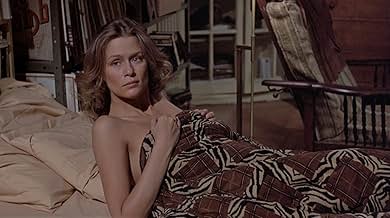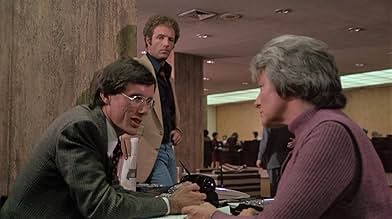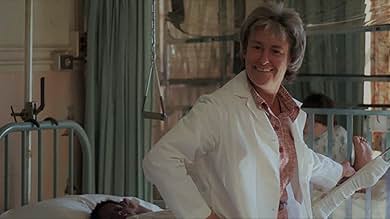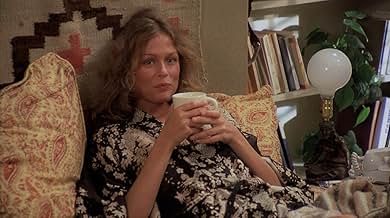Literature professor Axel Freed is a gambling addict. When he has lost his money, he borrows from his girlfriend Billie, then his mother Naomi, and finally some criminals that chase him. Des... Read allLiterature professor Axel Freed is a gambling addict. When he has lost his money, he borrows from his girlfriend Billie, then his mother Naomi, and finally some criminals that chase him. Despite all of this, he cannot stop gambling.Literature professor Axel Freed is a gambling addict. When he has lost his money, he borrows from his girlfriend Billie, then his mother Naomi, and finally some criminals that chase him. Despite all of this, he cannot stop gambling.
- Awards
- 1 nomination total
- Director
- Writer
- All cast & crew
- Production, box office & more at IMDbPro
Featured reviews
From the first scene to the last I was on the edge of my seat. Bet after bet my stomach turned. Caan's Axel Freed is driven to hit the big one, but it never seems to come or be enough. He loves the thrill of losing and feels safe when he is at the bottom.
Watching Freed bet tens of thousands of dollars on whims is excruciating. This film is one huge car wreck that you can't turn away from. With each scene the damage gets worse and worse.
"If all my bets were safe they just wouldn't have any juice," he tells his bookie.
Axel is never happy--even when he is doing the thing he enjoys most. You can see the underlying dissatisfaction he has with his job, his life, and the universe in general. The only constant in his existence is the bet. Win or lose.
Freed is very adept at evading the lowlifes he owes his shirt to. It is a joyride for him to constantly "dodge the bullet". That is why each bet becomes riskier and riskier. He wants to see what will happen to him when all of his luck runs out.
At one point in the film Axel reads a passage from an essay on George Washington to his class. He and his students conclude that Washington was afraid of failure and that he tried to remove the element of risk from everything he did. It is the very antithesis of Axel's life as a gambler. He creates situations that are totally immersed in risk believing that it is the only way to ensure true success. All or nothing. He is willing to compromise not only himself, but anyone around him who cares about him. By displaying his dark, self-destructive side he gambles with their feelings and challenges them to either love him or leave him.
It was a special treat to see two actors (Cann and Sorvino) who are in two of the best crime movies ever made (The Godfather and Goodfellas) together in the same film.
Also Antonio Vargas is appropriately slimy as the Pimp (sort of an R-rated Huggy Bear).
There are some pivotal moments in the film like when Axel is told that he must get one of his basketball-playing students to fix a game; or when he confronts his millionaire grandfather after learning that he refused to cover his debt.
I won't give away the ending, but the payoff is not what you would expect in American cinema.
Watching Freed bet tens of thousands of dollars on whims is excruciating. This film is one huge car wreck that you can't turn away from. With each scene the damage gets worse and worse.
"If all my bets were safe they just wouldn't have any juice," he tells his bookie.
Axel is never happy--even when he is doing the thing he enjoys most. You can see the underlying dissatisfaction he has with his job, his life, and the universe in general. The only constant in his existence is the bet. Win or lose.
Freed is very adept at evading the lowlifes he owes his shirt to. It is a joyride for him to constantly "dodge the bullet". That is why each bet becomes riskier and riskier. He wants to see what will happen to him when all of his luck runs out.
At one point in the film Axel reads a passage from an essay on George Washington to his class. He and his students conclude that Washington was afraid of failure and that he tried to remove the element of risk from everything he did. It is the very antithesis of Axel's life as a gambler. He creates situations that are totally immersed in risk believing that it is the only way to ensure true success. All or nothing. He is willing to compromise not only himself, but anyone around him who cares about him. By displaying his dark, self-destructive side he gambles with their feelings and challenges them to either love him or leave him.
It was a special treat to see two actors (Cann and Sorvino) who are in two of the best crime movies ever made (The Godfather and Goodfellas) together in the same film.
Also Antonio Vargas is appropriately slimy as the Pimp (sort of an R-rated Huggy Bear).
There are some pivotal moments in the film like when Axel is told that he must get one of his basketball-playing students to fix a game; or when he confronts his millionaire grandfather after learning that he refused to cover his debt.
I won't give away the ending, but the payoff is not what you would expect in American cinema.
a shocker in the 70s james toback's take on Dostoevskyan's fate, caan actually seems to act instead of react and gives a far more compelling performance than say, Thief 7 yrs. later. The Gambler is James toback's career making debut and has some of the most intense scenes toback would ever film despite numerous strong films later on. the ending is monumental. watch it build and be amazed. 9 of 10.
I grew up amongst gamblers, spending much of my time hustling bowling and gin rummy throughout the Midwest, until, at 17, I shuffled off to the Ivy-covered walls of a prestigious Eastern College.
This gives me much simpatico with Axel Freed, the central character and portrait of self-destruction, the gambler, and James Toback, the film's author. Toback's own reflections suggest that Axel is in many ways auto-biographical.
As a film, The Gambler is shortsighted, an ambitious but nonetheless failed attempt by a first-time screenwriter in difficult waters. It is not without its brilliance-its relentless dedication toward conveying that any gambler's true goal is not success, but utter humiliation-destruction of one's self, and anything and anyone around him. It can be no other way.
In the 1990's where independent film has achieved an emergence and respect in its own, a film like this might have found the strength among the very talented people involved, (Toback, James Caan, Karel Reisz) to emerge into a true gem. Alas this 70's neglected studio cast-off didn't have that opportunity.
London Lee is great in support, Paul Sorvino and Burt Young are well cast as Freed's mob-ties. Young's performance as a mob leg-breaker includes quite a raw, and shocking collection scene.
Probably a pass for any but the gambling addict, for them, a head (as in tape-head) burner. For those who are intrigued by Toback's intelligent approach to the seedier side, try his next effort, Fingers (1978), a diamond in the rough.
This gives me much simpatico with Axel Freed, the central character and portrait of self-destruction, the gambler, and James Toback, the film's author. Toback's own reflections suggest that Axel is in many ways auto-biographical.
As a film, The Gambler is shortsighted, an ambitious but nonetheless failed attempt by a first-time screenwriter in difficult waters. It is not without its brilliance-its relentless dedication toward conveying that any gambler's true goal is not success, but utter humiliation-destruction of one's self, and anything and anyone around him. It can be no other way.
In the 1990's where independent film has achieved an emergence and respect in its own, a film like this might have found the strength among the very talented people involved, (Toback, James Caan, Karel Reisz) to emerge into a true gem. Alas this 70's neglected studio cast-off didn't have that opportunity.
London Lee is great in support, Paul Sorvino and Burt Young are well cast as Freed's mob-ties. Young's performance as a mob leg-breaker includes quite a raw, and shocking collection scene.
Probably a pass for any but the gambling addict, for them, a head (as in tape-head) burner. For those who are intrigued by Toback's intelligent approach to the seedier side, try his next effort, Fingers (1978), a diamond in the rough.
This is a film that must be seen to be believed.
Caan is extraordinary; the emotional truth of this film penetrates each line, each scene...The most searing and intense and exact ending in modern film. The straight-forward telling of a professor with a gambling problem does not prepare one for the scale and price of betrayal and redemption of human emtions that are portrayed. A stunning film.
Caan is extraordinary; the emotional truth of this film penetrates each line, each scene...The most searing and intense and exact ending in modern film. The straight-forward telling of a professor with a gambling problem does not prepare one for the scale and price of betrayal and redemption of human emtions that are portrayed. A stunning film.
Sometimes he wins; but mostly he loses. Gambling is an addiction for Axel Freed (James Caan), a professor of English literature and lover of classical music. The film is set in New York City.
The object of the obsession can be almost anything on which a bet is placed: dice, cards, a basketball game, a college football match. It really doesn't matter. Axel just can't keep from making bets. He's like two different people. In a classroom setting, he is logical and intelligent. But when betting, he throws away the logic in favor of risk taking. In these situations he seems to lack the normal psychological "brakes" that could be applied to his destructive over-betting. In his own words: "I like the threat of losing". And always in the background are the thugs and the con men that lord over Axel, when he borrows to gamble, but can't pay his debt.
Some of Axel's classroom lectures have real thematic value. The ideas relate both to him, and incidentally to some modern-day politicians. For example, a person "... claims an idea is true because he wants it to be true, because he says it's true. And the issue isn't whether he's right, but whether he has the will to believe he's right, no matter how many proofs there are that say he's wrong". Axel continues: "D.H. Lawrence says Americans fear new experience more than they fear anything. They are the world's greatest dodgers, because they dodge their own very selves". Heavy stuff.
Despite a disappointing ending, "The Gambler" is an interesting character study of a personality type that is all too prevalent in modern society. The film's color cinematography is generally dark, in keeping with the film's theme. Overall acting is fine. Paul Sorvino gives an especially convincing performance, as does James Caan. The plot proceeds rather slowly.
Mostly, the film has terrific thematic value. It encourages the viewer to pause and reflect, to ponder, to question one's own motivations. That is a trait lacking in many current movies.
The object of the obsession can be almost anything on which a bet is placed: dice, cards, a basketball game, a college football match. It really doesn't matter. Axel just can't keep from making bets. He's like two different people. In a classroom setting, he is logical and intelligent. But when betting, he throws away the logic in favor of risk taking. In these situations he seems to lack the normal psychological "brakes" that could be applied to his destructive over-betting. In his own words: "I like the threat of losing". And always in the background are the thugs and the con men that lord over Axel, when he borrows to gamble, but can't pay his debt.
Some of Axel's classroom lectures have real thematic value. The ideas relate both to him, and incidentally to some modern-day politicians. For example, a person "... claims an idea is true because he wants it to be true, because he says it's true. And the issue isn't whether he's right, but whether he has the will to believe he's right, no matter how many proofs there are that say he's wrong". Axel continues: "D.H. Lawrence says Americans fear new experience more than they fear anything. They are the world's greatest dodgers, because they dodge their own very selves". Heavy stuff.
Despite a disappointing ending, "The Gambler" is an interesting character study of a personality type that is all too prevalent in modern society. The film's color cinematography is generally dark, in keeping with the film's theme. Overall acting is fine. Paul Sorvino gives an especially convincing performance, as does James Caan. The plot proceeds rather slowly.
Mostly, the film has terrific thematic value. It encourages the viewer to pause and reflect, to ponder, to question one's own motivations. That is a trait lacking in many current movies.
Did you know
- TriviaAccording to James Toback, before his screenplay was accepted at Paramount Pictures, and was making the rounds with actors, Peter Boyle was first interested in playing the lead. Robert De Niro lobbied hard for the role, to the point where De Niro started to dress like the writer. Toback pressured director Karel Reisz to meet with De Niro. After meeting him, Reisz said that he would not, and could not consider De Niro for the role, and if Toback kept insisting, he would not be allowed to collaborate on the film further.
- GoofsAxel knocks the pimp's hat off on the second punch. It reappears on his head on the following one.
- ConnectionsFeatured in WatchMojo: Top 10 Gambling Movies (2014)
- SoundtracksSymphony No. 1 in D
Written by Gustav Mahler (as Mahler)
Performed by Koninklijk Concertgebouworkest (as The Concertgebouw Orchestra)
Conducted by Bernard Haitink (as Haitink)
Courtesy of Philips Records
- How long is The Gambler?Powered by Alexa
Details
- Release date
- Country of origin
- Language
- Also known as
- The Gambler
- Filming locations
- Harlem, New York City, New York, USA(Final scenes)
- Production company
- See more company credits at IMDbPro
Box office
- Gross US & Canada
- $1,305,782
- Runtime
- 1h 51m(111 min)
- Sound mix
- Aspect ratio
- 1.85 : 1
Contribute to this page
Suggest an edit or add missing content



































